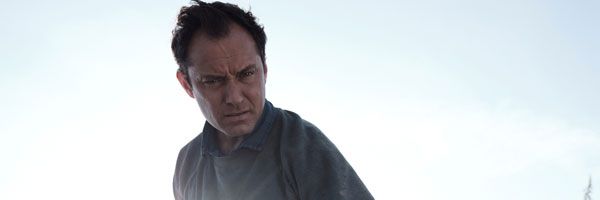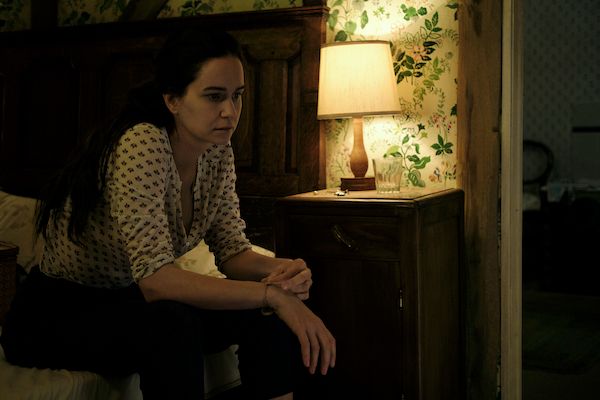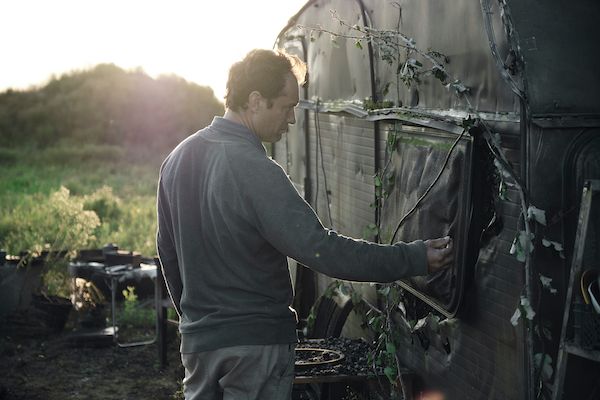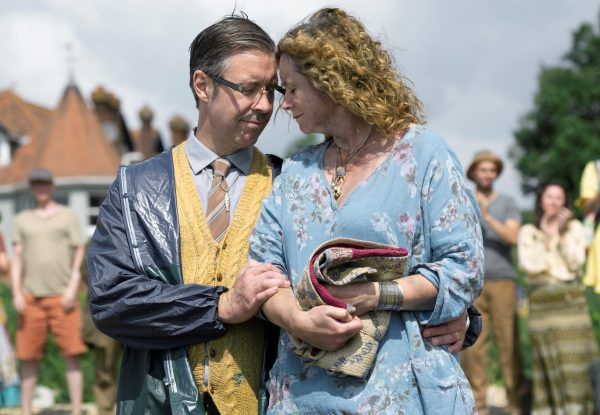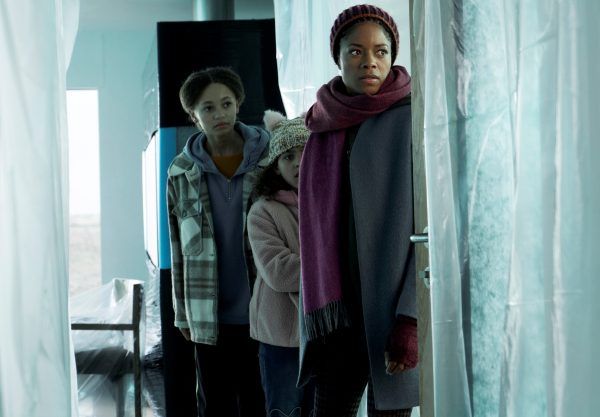Created by Felix Barrett and Dennis Kelly, the six-episode limited HBO series The Third Day is a psychological thriller set on the mysterious British island of Osea and is told in two parts. In “Summer” (Episodes 1-3), directed by Marc Munden, Sam (Jude Law) finds himself on the island and isolated from the mainland while being surrounded by a group of inhabitants that will go to any lengths to preserve their traditions. And then, in “Winter” (Episodes 4-6), directed by Philippa Lowthorpe, single mother Helen (Naomie Harris) comes to the island with her daughters — in search of answers but faces more questions.
During the virtual press junket for The Third Day, Collider got the opportunity to chat with executive producers Barrett and Kelly about this unique project, the key to unpacking what it would be, what would have happened if they hadn’t found Osea Island as a shooting location, getting Jude Law on board, shooting a live episode in between the two parts of the TV series, and continuing to search for innovative new storytelling techniques.
Collider: How did this unique project come about?
FELIX BARRETT: We were approached by a broadcaster who said, “Can we come and do a backstage film of your show?” And I was like, “Well that would destroy the whole magic of what we do, and also, it would be a bit boring programming.” But it got us thinking, “Is there some way that you could televise theater and that danger of the live? Is there a middle ground?” So, I went back to them with that idea, in terms of this world in which artists cross-fertilize, and wondered if we could do something that passes the story baton from TV to live to back again, making it greater than the sum of its parts. They said, “Great but you’re gonna need an absolutely brilliant writer who can do both screen and stage.” Immediately, it was all to the genius Dennis Kelly, and then it came quite quickly. For the past however many years, we’ve been trying to unpack this.
What was the key to unpacking it then?
DENNIS KELLY: There were a few things, actually. When Felix and Punchdrunk approached me, at that time, we didn’t really know what it was. They had some really interesting research resources about folklore and that all felt really useful. He had already talked to Jude Law, so we knew there was an actor. What I had to do was come along and create the character, and create other characters for that character to interact, and create a place for that to happen, and create a mythology for that to exist and to give it a reason. Ultimately, things need a reason. Initially, we didn’t know where we were gonna set it. We were talking about setting it in a little town but there’s no town in England that feels as cut off as we needed. And then, Felix found Osea Island. He said, “Come over, you need to see this island.” When I went there, it was just really clear that it was a perfect place because there’s something strange about the island. You cross that causeway and even though you’re in Essex, you don’t feel like you are. You feel like you’re in another separate world. That was the biggest single event that made us realize what this would be.
BARRETT: This was gonna be a different project but that other project completely evaporated. I thought, “I have to get Dennis here,” because it was ripe with atmosphere. It’s an amazingly strange place that’s equal parts beautiful and haunted. There’s a strange absence. So much of the world and narrative came from Osea. Osea is a real character in it.
What would have happened, if you hadn’t come across that?
KELLY: I don’t know. We were talking about setting it in a town and finding as remote a town as we could find but I don’t think it would have been what it is. The island gives allows for the idea of a community that has grown in isolation, which is what’s happened. It’s not like they never go to the mainland. They’re connected to the mainland and they move amongst the mainland but they get to grow and evolve themselves. I think that would be hard to make happen, if we had created a town or a village.
BARRETT: There’s a claustrophobia on Osea. As soon as the causeway floods, you really do feel trapped, even though you can see the mainland. The fact it’s visible and tantalizingly close means you feel even more cut off. If we had set it in Berwick-upon-Tweed, up in Northumberland, Sam would have just gotten the first train out of there and the story would have ended, after about 15 minutes.
How did you get an actor like Jude Law to sign on without a character and without a script? How did you sell him on this before there was something to sell this project with?
BARRETT: What’s brilliant about Jude is that he’s really ambitious and he’s hungry to try to do things that haven’t been done before, which is a real driver for me too. We talk about breaking new ground. If the audience is too relaxed and too familiar and knows what’s gonna happen, then they become passive and they switch off their synapses and aren’t firing. But if we’re creating something that’s both television and live, and the audience is trying to work out how to navigate this and hold the storyline throughout, they’re actually having to lean in and really become part of it. He loved the idea of that. He also loved the idea, as an actor, that screen acting and theatrical acting are very different techniques. He’s so brilliant at both that it’s quite unusual to be able to use both of those sides of your craft with the same character, so that was a huge attraction. Even though he said, “Let me know when you’ve got something,” it took about five years.
KELLY: In fairness, there were conversations going on with Jude but it wasn’t until we actually had some scripts that we were fairly confident we were gonna shoot, that we officially approached him. We even got Marc [Munden] to agree to direct the first block. We were in a much more solid state, by the time we actually spoke to him seriously.
Did having Jude Law on board make it easier to put the rest of this great cast together?
KELLY: It is a great cast. It can help a little bit to have an actor where, if you like and respect him, you might be more likely to do it yourself. But also, a lot of the time for actors, it’s about directors. The Third Day is in three parts – “Summer,” “Autumn” and “Winter.” You can watch the TV series without watching the live and the story will still work but if you watch it all together, you’ll get a much bigger experience. We designed it in that way. So, we knew early on that the live would be its own thing, and if we wanted “Summer” and “Winter” to also be their own thing, we would need to talk to some really good filmmakers about making it. We got Marc Munden and Philippa Lowthorpe, and we were really lucky that they both were very engaged and interested in doing it. That meant that they would both bring their own filmmaking to it, so both blocks feel very different. And then, Naomie [Harris] liked the scripts and was very interested in working with Philippa. So, for actors, it’s often a lot about the directors, a lot about the script, and also who else is doing it. Putting all that together worked.
What are the unique challenges to doing something like the “Autumn” piece that you have to do in between “Summer” and “Winter”?
BARRETT: Originally, it was planned to be a music festival with 10,000 people, pre-COVID. And then, during COVID, we thought we might lose it completely and there would be a hole in the middle of our show, all of these years in the making. So now, we’ve pivoted to rather than 10,000 in the audience to one audience, which is the single continuous take of the camera, charting the action of the day. The challenges are vast because we’re back on the island and it really is limited by the causeway and want it to be live theater. It’s a very different format to the TV. It’s got a different rhythm. Marc Munden says it’s more of a slow cinema. It means that it’s almost opposite to the fast pacing of conventional television. It’s replaced by this slow-creeping dread of real time, watching the community get ready, prepare, and stage their own local festival. So, the main challenge, over 12 hours in real time, is changing batteries and changing memory cards and, for the cast themselves, staying in character without a backstage or a green room. If they need a bathroom break, that’s all happening within the camera. We’re there in the middle of it. The ultimate method performance is needed. They’ve gotta act like the characters, the whole time.
KELLY: There are also challenges as far as the stories concerned, as well. Initially, we were creating a 10,000 person music festival, so we knew that not everyone who was gonna watch the TV could go to the festival. Not by a long shot. We knew that we had to make something where you could watch the TV series without the live but at the same time, the live needed to feel like it was the same thing. It doesn’t just wanna feel like an add on. It needs to carry a story but if you don’t know that story, you still have to be able to enjoy the main thing. It was really important for me that, when approaching this, we made a TV series that was really high quality, in its own right. Each one of these pieces needs to be very high quality, in its own right. You can’t just go, “Well, we’re doing something innovative. We’re doing this thing with the theater and that’s innovative. That’s my innovation.” You need to be innovative, across the entire thing, and you need to make sure that you’re the level that you’re making this stuff at is quite high level, and that was a challenge. It’s always hard to just keep going to make it as tight and taught as you can.
After having an experience like this, would you be interested in trying something like this again? Are you continuing to look for other new possible innovative approaches to storytelling?
BARRETT: It’s such an amazing time. Over lockdown, events are happening where there are mediums within mediums. We’re in this incredible place for storytelling and it’s about the purity of that. If the bare bones of it are strong and confident, and if it could exist in a simple form, then you can start to unpack it. We’re got such an exciting decade ahead of us. There are so many more experiments to be had. To be honest, we’re gonna learn so much by doing this. What’s interesting is that even though the TV series is made and we’re hugely proud of it, the live isn’t and that’s now coming. That’s already two different rhythms working. We’ll know far more on October the 4th.
KELLY: It’s a strange thing. You put so much energy into getting it done because it’s such an unusual thing to do. With all of that, we’ve got no idea, if it’s ever gonna work. You’ve never really got an idea whether something’s good or bad. You might have something to judge it by but with this, we’ve got so little. We really will know on October the 4th whether it’s the stupidest idea that anyone ever had, and we’ll find out quite brutally. We’ve learned a lot and it would be nice to put that knowledge into practice. I think audiences now are getting ridiculously sophisticated and storytelling is matching that, particularly in TV, as we all know, in a really interesting way. In theater it has been, as well. It keeps going. You need to keep pushing things.
BARRETT: In the future, we’re working with Niantic, the creators of Pokémon Go, who use their software and game play to play games around the world or on the streets that you live in, and we’re looking at how to tell stories with that. We’re looking at how Dennis and I could tell a story through a mobile phone, across the streets of Chicago. I think there are so many different ways that narrative is exploding and it’s all there for the taking. Equally, we need to get past October the 4th first.
KELLY: We may never speak to each other again.
The Third Day airs on Monday nights on HBO and is available to stream at HBO Max.
Christina Radish is a Senior Reporter of Film, TV, and Theme Parks for Collider. You can follow her on Twitter @ChristinaRadish.

